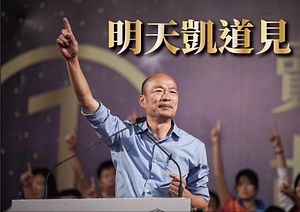Taiwan’s opposition Kuomintang (KMT) party will choose its presidential candidate early next week as it prepares to challenge a rejuvenated President Tsai Ing-wen in the country’s upcoming 2020 election.
Tsai and her ruling Democratic Progressive Party (DPP) have recovered from a crushing defeat in last year’s regional elections by firmly rejecting Beijing’s “one country, two systems” formula for Taiwan, stridently supporting protesters opposing Hong Kong’s controversial extradition law, and securing close ties with the United States, culminating in a US$2.2 billion arms sale approved earlier this week.
Leading KMT candidates Han Kuo-yu, the populist mayor of Kaohsiung and the favorite to win the nomination, and Foxconn founder Terry Gou are making last-ditch efforts to position themselves as the party’s ideal counterweight to the suddenly resurgent DPP.
Just two months ago, opinion polls projected both Han and Gou to easily beat Tsai in January 2020’s general election. But recent polls put Tsai firmly in the lead, a product of her ability to portray the traditionally KMT-friendly as the favored party of Chinese leadership, and her own DPP as a reliable protector of Taiwan’s democracy and sovereignty.
Han and Gou, along with former New Taipei Mayor Eric Chu, worked to distance themselves from Beijing ahead of the opening of party primary polls earlier this week. The KMT chooses its candidate based on landline phone polls to random Taiwanese voters and does not filter respondents by party affiliation.
Han’s entry into the race has polarized Taiwan, pitting his rabid supporters, who flood the streets by the thousands for his energetic rallies, against opponents who see Han as dangerously friendly toward Chinese interests.
Last month, tens of thousands rallied in Taipei to protest the proliferation of pro-China narratives in Taiwanese media, an action inspired in large part by Han’s burgeoning candidacy. Some prominent local networks – owned by the Want Want China Times Group, part of a conglomerate with significant investments in China – have devoted extensive airtime to casting Han in a favorable light to the point of being fined by Taiwan’s National Communications Commission.
Han, who visited China and met with Chinese government officials in March to promote cross-strait trade, has reiterated his opposition to “one country, two systems” and his support for the Republic of China (ROC). But he has eschewed opportunities to be critical of Beijing, drawing scrutiny last month for claiming not to know about the ongoing protests in Hong Kong.
Still, support remains rabid for the Kaohsiung mayor, despite a lukewarm performance in a recent slate of TV debates. Polls have consistently placed Han a few points ahead of Gou, who has challenged Han’s promises of economic prosperity by touting his success as chairman of Foxconn.
Gou, one of Taiwan’s richest men, entered the race in April by claiming a sea goddess had told him to run for president. He has attempted to reach out to young voters worried about a dearth of career prospects and an economy that has grown only modestly during Tsai’s presidency.
But the famously short-tempered Gou has found himself on the defensive over his own ties to Chinese business and political leaders. He recently pledged to force Beijing to recognize Taiwan’s official ROC title in cross-strait talks and, at home, has called the owner of Want Want the “hatchet man” of Beijing and painted Han as being too close to pro-unification forces.
Despite enjoying recent momentum in the race, Gou is still projected to lose to Han in the ongoing primary polls. He has not yet promised to support the eventual KMT candidate should he lose, leaving the door open for an independent run that could split KMT voters in the general election.
Chu, the KMT’s unsuccessful 2016 presidential candidate, has consistently polled in a distant third place but will hope that his calls for party unity during KMT debates are received fondly by voters tired of what has become a particularly contentious primary.
The KMT plans to announce its candidate on Monday, July 15 – and a Han victory could set off a chain reaction of events that would impact Taiwan’s general election.
Aside from a potential independent run by Gou, there has been heavy speculation that independent Taipei Mayor Ko Wen-je will announce his long-rumored presidential bid should Han win the KMT primary early next week. Ko remains popular among young voters and would likely draw voters away from both of Taiwan’s major parties. But his recent reiteration that Taiwan and China are “one family” has enraged the DPP – although he claims to be a cross-strait free spirit, primarily concerned with maintaining Taiwan’s own strength as it sits amid a power struggle between China and the United States.
While KMT candidates have also spoken of balancing ties between Washington and Beijing – in contrast to Tsai, who has strengthened Taiwan-U.S. relations amid a refusal by Chinese officials to negotiate with members of her government – the party’s China-friendly stance has left its candidates scrambling to brandish their China-skeptic credentials. Tsai, with the wind firmly in her sails, now waits to see who will serve as the primary roadblock to her second term as president.

































